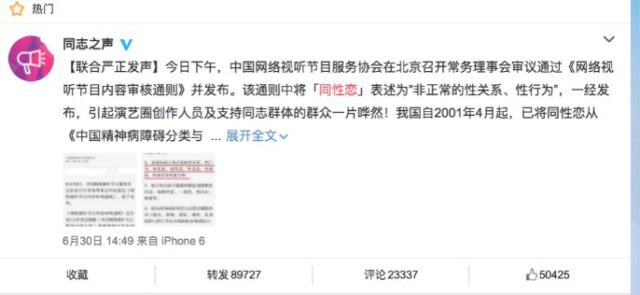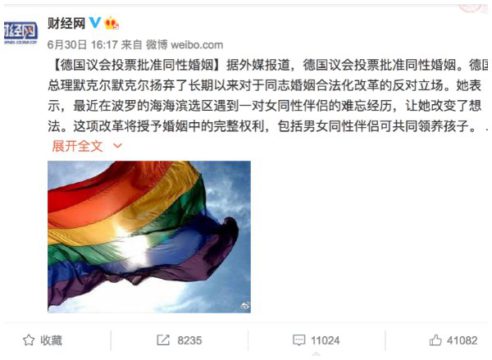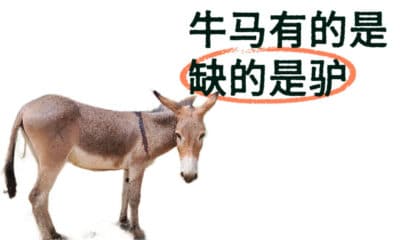Featured
“One Step Forward for Germany, One Step Back for China” – Weibo Discussions on Homosexuality
On June 30, two important moments happened for gay emancipation – one is called “a step forward”, the other “a step backward.”
Published
8 years agoon

The June 30 concurrence of Germany legislating same-sex marriage and China banning “displays of homosexuality” in online videos, has triggered heated discussions on Chinese social media. Many Chinese express bittersweet feelings, saying that Germany’s ‘step forward’ makes it clear that China is going ‘backward’ when it comes to societal attitudes toward homosexuality.
On the same day that same-sex marriage was legalized in Germany, Chinese regulators issued new criteria for online programs that classify homosexuality as an “abnormal sexual relationship.”
According to the new regulations that were released on Friday, online videos in mainland China can no longer portray “abnormal sexual relations,” listing homosexuality together with incest and sexual abuse.
“It won’t be long before our voice will be gone from Weibo. If we disappear, we hope you won’t give up.”
The new criteria drew a lot of criticism on social media. Many Chinese LGBT groups, including Comrade’s Voice (@同志之声: ‘comrade’- tóngzhì – is a common way to refer to gays), denounced how Chinese regulators represented homosexuality. Comrade’s Voice even made a public plea, asking the regulators to correct their “errors,” as they are “harmful to China’s LGBT community.”
Their Weibo post received over 23330 comments and 90000 shares within 24 hours. The post has since been locked for further comments.

LGBT group “Comrade’s Voice” denounced the new rules on Weibo.
On July 1st, Comrade’s Voice wrote that their options for posting and commenting on Weibo had become limited, and that there were indications their account, which has over 160670 followers, might soon be closed by online regulators.
“We want to thank everyone for making Comrade’s Voice such a powerful voice since it came into being in 2009. Our [recent] post received over 80.000 shares (..), we thank you for your courageous voices. The post has now been disabled for commenting and sharing. As we’ve seen with others, it won’t be long before our voice will be gone from Weibo. If we disappear, we hope you will not give up on any opportunity to let your voices be heard. Equal rights don’t come dropping from the sky. Please be kind-hearted and loving, please stay positive about the future. Our work won’t stop (..). Our existence is in your hands.”
Many commenters showed their support. One woman wrote: “As a mother, I won’t stop fighting – my child has the right to choose whoever she wants to love when she grows up.”
“I love men! I am guilty! I am at fault! I am inhumane!”
As news of the new criteria went viral on Chinese social media, news of the legalization of gay marriage in Germany also made headlines – only adding more fuel to the fire.
“I just don’t know how to respond to this,” one female netizen wrote: “I see both of these news items together in the list of trending topics,.. one about Germany’s gay marriage legalization, and the other about Chinese censorship of displays of homosexuality,..”

Caijing about the German legalization of same-sex marriage on Weibo – soon attracting thousands of comments.
“The opposite of this progress is what is happening in China,” one person responded with a broken heart emoticon.
Others also pointed out that while Germany is going a step forward, China is going a step backwards (“一个在进步 一个在倒退”), especially now that online censorship has been sharpened. One person wrote:
“Why don’t we just go back to dynastic rule?1 (..) Love for the country and love for the Party is not the same thing. I love China dearly. But now I can’t do anything but helplessly look how she is being pestered. The 404 error pages just keep coming. The Hou Liang Ping case2, the Chinese table tennis team3, the Shanghai Nanjing West street incident4, etc etc. Is 2017 the year that things are going downhill? It is not that we do not love our country, but our country does not love us.”
Another male netizen wrote:
“I love men! I am guilty! I am at fault! I am inhumane! I will wear the dunce cap (高帽子) and the horizontal banner, so that all the people can criticize and humiliate me!”5
In large numbers, Weibo netizens applauded Germany’s new law and expressed their support for China’s gay community. “I am not gay, but I am rooting for you,” many said.
“Thank you all for raising your voices for the gay community. I know that the majority of people are heterosexual, but the fact that you are supportive gives us great courage,” one 21-year-old netizen wrote.
“In reality, there are still many people in society who cannot accept gays.”
“In Taiwan, gay marriage is legalized. In Germany , gay marriage is legalized. In China, homosexuality is ‘abonormal sexual behavior’,” some commenters wrote.
Many jokingly said that China might as well go back to the times when men wore a braided queue and women had their feet bound.
Although the vast majority of people on Weibo speak out in support of the LGBT community, there are also people who point out that these supportive voices on social media do not necessarily reflect the reality. He writes: “Online, you see how the majority of people here feel about homosexuality, but in reality, there are still many people in society who cannot accept gays. As for me, I would already be very happy if my family could accept my sexual orientation.”
But today, rainbow flags are ubiquitous on Weibo and anti-gay comments are difficult to find. Virtually all commenters seem to agree that defining homosexuality as an “abnormality” along with incest and perversity, on the same day that Germany becomes the 23rd country to legalise gay maririage, is a step back for China.
One Weibo blogger by the name of TangTang posted on July 1st:
“I oppose the new online regulations.
1. Please tell me what freedom of speech is, because is this what it’s supposed to be?
2. I am not homosexual, but I will defend to the death the rights of gay people.
3. I will wait and see when this post gets deleted.”
By Manya Koetse
Follow @whatsonweibo
1*”现在的中国 要不把辫子留起来吧” Freely translated. Commenter literally says “how about we bring back the braids,” referring to the common hairstyle of the Qing dynasty. The braided queue was also a sign of repression.
2 This is about allegations of sexual abuse at Beijing Film Academy: https://www.hongkongfp.com/2017/06/13/social-media-users-fight-back-weibo-censors-allegations-sexual-abuse-beijing-film-academy/
3 About the turmoil in the national table tennis team: https://chinadigitaltimes.net/2017/06/minitrue-quiet-top-players-ping-pong-protest/
4 East Nanjing Road protest over housing crackdown: http://shanghaiist.com/2017/06/12/shanghai-property-protest.php
5Practice during Cultural Revolution: http://www.bbc.com/news/world-asia-china-19807561
©2017 Whatsonweibo. All rights reserved. Do not reproduce our content without permission – you can contact us at info@whatsonweibo.com.
Manya is the founder and editor-in-chief of What's on Weibo, offering independent analysis of social trends, online media, and digital culture in China for over a decade. Subscribe to gain access to content, including the Weibo Watch newsletter, which provides deeper insights into the China trends that matter. More about Manya at manyakoetse.com or follow on X.

China World
“It’s in the Details” – The Xi-Trump Meeting on Chinese Social Media
“The tariff drama, directed by Trump himself with himself as the main actor, has finally come to an end.”
Published
24 hours agoon
October 30, 2025
The meeting between Xi Jinping and Donald Trump has been a major topic across Chinese social media over the past days, from the announcement of the big ‘G2’ summit to the actual meeting between the two nations, which have been caught up in trade tensions and rocky relations. The announcement became the top trending topic across Chinese social media platforms.
The meeting, that lasted approximately 1 hour and 40 minutes inside Gimhae International Airport in Busan, South Korea, was the first in-person meeting between Trump and Xi since Trump began his second term in January 2025. The summit took place on the sidelines of the APEC (Asia-Pacific Economic Cooperation) meetings and concluded Trump’s ‘Asia tour’ that also included visits to Malaysia and Japan.
Chinese news reports about the meeting were overall positive, with Xinhua noting that the two leaders agreed to strengthen cooperation in various areas and promote “people-to-people exchanges.” State-run media also reported Xi’s emphasis on dialogue over confrontation and highlighted Trump’s praise of China.
Trump himself told reporters that he rated the meeting with Xi “a 12 out of 10.” On Truth Social, he also called it a “truly great meeting” that resulted in some major agreements.
Among others, the US cut fentanyl-related tariffs on China from 20% to 10%, China agreed to pause its October 9 export controls on rare earths for one year, while Washington suspended related controls, and Beijing authorized massive purchases of American soybeans and agricultural products.
The two sides also agreed to maintain regular contact. Trump expressed his hope to visit China in April 2026 and invited President Xi to visit the United States.
Video footage showing Trump escorting Xi to his vehicle after the meeting went viral across platforms from Toutiao to Douyin (“特朗普送习近平上车”).
As often happens in a social media environment where in-depth discussions of high-level meetings are heavily restricted, it’s the visuals that matter — with netizens dissecting the gestures and body language of both leaders.
One image that circulated online focused on the difference in body language between the Trump-Xi meeting and the meeting between Trump and Japan’s new leader Takaichi, suggesting it translates to different power dynamics.

Trump and Takaichi versus Trump and Xi.
On October 28, when Trump met with Takaichi, he appeared to ignore cues to salute the Japanese flag, instead briskly walking past it. Takaichi looked visibly surprised. While some attributed it to poor etiquette guidance behind the scenes, most reactions framed it as a reflection of the power dynamics in the US–Japan relationship — with the US clearly on top.
The smaller meeting moments and visual gestures of respect that Trump showed toward Xi were seen by many — including this Zhihu commenter, 高山流水教育者 — as signs of China being acknowledged as an equal world power.
These gestures ranged from Trump arriving at the venue early and “respectfully waiting” (恭候) for the Chinese delegation, to being the one who extended his hand first during the handshake. After the meeting, both leaders smiled and Trump courteously escorted Xi to his car and exchanged a few quiet words with him.
The commenter writes: “The truth lies in the details!” (“细节见真章” xìjié jiàn zhēnzhāng).
With the fruitful outcome of the meeting and Trump showing clear respect toward China — and, as many suggested, even more respect than toward Japan — there seems to be a generally positive attitude online and a noticeable shift in sentiment toward the US president on Chinese social media.
“Old Trump is an honest guy,” one person wrote on Weibo. Others on Douyin wrote: “US–China cooperation is a win-win situation.”
One observer on Weibo wrote: “The tariff drama, directed by Trump himself with himself as the main actor, has finally come to an end after all his tossing and turning. Life is like a play and it all depends on your acting skills. Old Trump treats politics as a show, which has broadened our horizons and added a bit of extra amusement to the world.”
By Manya Koetse
(follow on X, LinkedIn, or Instagram)
Spotted a mistake or want to add something? Please let us know in comments below or email us. First-time commenters, please be patient – we will have to manually approve your comment before it appears.
©2025 Whatsonweibo. All rights reserved. Do not reproduce our content without permission – you can contact us at info@whatsonweibo.com.
China Memes & Viral
From Nobel Farewell to ‘VIP Toilets’: What’s Trending in China
From a tragic “wild child” case in Yunnan to the farewell of Nobel laureate Yang Chen-Ning, here’s what’s trending on Weibo and beyond this week across Chinese social media.
Published
2 weeks agoon
October 19, 2025
🔥What’s Trending in China This Week (Week 42, 2025)? Stay updated with China Trend Watch by What’s on Weibo — your quick overview of what’s trending on Weibo and across other Chinese social media.
1. “Wild Child” from Yunnan Sparks Concern and Investigation

Screenshots circulating on Chinese social media showing the “wild child” in Yunnan.
A tragic and widely discussed story from Yunnan has been trending on Weibo this week, centering on a 3-year-old boy from Nanjian County who was spotted near a highway service area — naked, neglected, and walking on all fours. Online videos led Chinese netizens to dub him the “feral child.”
There have been conflicting media reports on the case over the past few days. From The First Scene (@第一现场) to Shanghai Reporter (上观新闻) some claimed the child’s parents are impoverished and jobless while others reported the father and mother are actually highly educated and do have resources, but that the choice to raise their child like this is related to lifestyle philosophy. The parents reportedly insisted that the child used to suffer from eczema and found clothes irritating and painful, so “he doesn’t like wearing clothes.”
One thing that local villagers quoted in these reports agree on is that the situation is “not normal.” The child, who never wears clothing, allegedly mimics animal behavior and refuses to eat from his hands — preferring to eat food off the ground. Locals previously already villagers reported the situation to the police.
Authorities in Nanjian County have announced the creation of a special task force to investigate this case. Officials said no signs of human trafficking were found, and that the parents are currently outside Yunnan Province. According to Beijing Youth Daily, The child and his parents are now under supervision, although it is not clear what this actually means – since other sources say the parents are not willing to cooperate. They also have another boy, who is currently one year old. Authorities have also investigating whether the parents’ behavior constitutes a crime.
Manya’s Take:
The “wild child” story brings back memories of the Xuzhou mother of eight. That heartbreaking case also gained national attention after netizens shared a video showing a woman chained up in a shed next to her family home. The chaotic media coverage of that case mirrors what we’re seeing now: media outlets are quick to jump on the story, while local authorities — feeling public anger and pressure — rush to investigate, resulting in conflicting reports, rumors, and fake news. Both situations involve rural counties that would otherwise hardly ever make headlines, with local authorities often unequipped to handle such crises quickly. Hopefully, there will be a clearer update on this story soon.
2. China Responds to Trump’s Remarks on Soybean Trade and Cooking Oil

Soybeans have been trending this week. As China is boycotting American soybeans – the fourth most sold agricultural product from the country – farmers in the US are facing uncertain times, as it’s harvesting season and the biggest purchaser of soybean exports is China.
On Tuesday, Trump wrote on Truth Social that China was “deliberately halting U.S. soybean imports,” calling it an “economically hostile act.” He also threatened to terminate business with China regarding cooking oil and other areas of trade as retribution.
On Chinese social media, people seemed unimpressed. The term TACO is also seen more often, a popular abbreviation for “Trump Always Chickens Out.” The Foreign Ministry dismissed Trump’s claims as “unfounded” and emphasized China’s commitment to normal trade relations. On Weibo, commentator Hu Xijin wrote: “Haha, so he [Trump] slaps tariffs on China and blocks chip exports and that’s not considered ‘hostile’? But when China doesn’t buy soybeans, suddenly it is? What kind of logic is that!”
Manya’s Take:
Chinese netizens are treating this latest trade exchange with irony rather than outrage, not only viewing it as a sign of US inconsistency on trade but also there’s some banter about the ‘cooking oil’ threat: when the US side talks about banning imports of “Chinese cooking oil” many assume they meant edible oil (食用油), while what the US actually imports from China is used cooking oil (UCO, 废食用油/地沟油) — waste oil that’s recycled to make biofuels. So the joke is that even Trump himself is seemingly mixing up cooking oil and used cooking oil, moreover threatening a ban that would hurt itself more than China, turning this trade spat into a moment of internet humor.
3. Nanjing Deji Plaza Faces Backlash Over VIP-Only Restrooms

The exclusive members-only restroom at Nanjing’s Deji Plaza.
Nanjing’s luxury shopping mall Deji Plaza (德基广场) has sparked controversy after introducing members-only restrooms accessible exclusively to VIP members (天象会员) who spend over 200,000 yuan ($28,000) annually. Access requires scanning a Deji membership QR code.
Beyond offering peace and privacy, the restrooms feature Tom Ford vanity sets, Jo Malone handwash, and Dyson hairdryers. One Xiaohongshu blogger (and VIP member) noted, “The maintenance cost here is ten times that of a regular restroom.”
After news of the VIP restrooms went viral, it fueled debate about turning ‘a basic human need’ into a ‘class privilege’ or “privatizing a public facility.” One user commented, “Now even restrooms have to reflect the wealth gap?”
Despite the criticism, curiosity grew — many users purchased “code-scanning services” on secondhand platforms to gain access, quickly undermining the restroom’s exclusivity. In response to the controversy, Deji Plaza stated that the members-only restrooms would soon be dismantled and converted into a regular public facility. Regardless, and despite the backlash, the initiative seems to have been fruitful in terms of brand name recognition, as it got everyone talking about Deji Plaza.
Manya’s Take:
There’s some irony in this story: there’s controversy over a mall toilet being “VIP,” yet at the same time, it’s the exclusivity that makes people want to try it. According to the latest posts on Xiaohongshu (XHS) by Deji Mall visitors, the VIP toilets are already gone, and people are back to complaining about the restrooms being too crowded and dirty. One XHS commenter (西蒙吴) had the best take on the issue: in a time when Chinese media are working to downplay the country’s wealth gap and ease public resentment, Deji Mall made the right move by dismantling the card-access VIP toilets — if not for the pressure of online public opinion, authorities might have stepped in themselves. It was an unwise move simply because it was all about a toilet: unlike VIP waiting areas or service counters, consumers don’t like restrooms being divided by class. A smarter approach would have been to create a VIP lounge that just happens to include a restroom.
4. Arc’teryx Responds to Tibet Fireworks Show Environmental Damage Investigation

The controversial fireworks show held in Tibet on September 19.
This is a topic that has sparked outrage and continued discussion in China over the past weeks. On September 19, a major fireworks event was held at an altitude of around 5,500 m or 18,000 feet in Tibet’s Himalayas, created by famous Chinese artist Cai Guoqiang (蔡国强) and sponsored by the outdoor brand Arc’teryx.
The 52-second show, titled “Ascending Dragon” (升龙) was supposed to impress people for its spectacular and colorful use of 1,050 fireworks, but it triggered outrage instead: critics blasted it as tone-deaf commercialization and ecological abuse of sacred and fragile land, and soon an investigation was launched.
Now, the outcome of that investigation has also become a major talking point as it revealed disturbance to local wildlife and caused significant environmental damage of over 30 hectares of grassland.
Cai Guoqiang and his studio will be held legally accountable for environmental damage, and Arc’teryx, as a sponsor of the event, will also bear legal responsibilities. Furthermore, the relevant county officials who had initially approved the show without going through the proper channels are also punished: Party Secretary Chen Hao (陈浩) has been dismissed, and nine other county officials received formal penalties ranging from removal to warnings.
Manya’s Take:
A lot has already been said and written about this controversy. What it comes down to, in the public perception in China, is that the high ambitions and personal goals of the artist and the Arc’teryx brand — which built its image around environmental responsibility and authentic outdoor culture — were pursued at the expense of Tibet’s fragile environment and marginalized communities. Their so-called “dreamlike” event left lasting scars for a fleeting 52-second spectacle. More than just serving as a warning for brands to ensure their actions align with their “eco-friendly” promises, this entire case will undoubtedly go down in history as a moment of awareness — a case study for future art events and large-scale performances in nature in China — on what not to do, and on how to balance spectacle with responsibility.
5. Nobel Laureate Yang Chen-ning Passes Away at 103

Yang Chen-ning passed at the age of 103.
The death of the renowned Chinese theoretical physicist Yang Zhenning (杨振宁, 1922), also known internationally as Chen-Ning Yang, China’s first Nobel laureate in physics, has been trending across Weibo, Douyin, Zhihu, and Toutiao in recent days. Yang passed away in Beijing on October 18, 2025, at the age of 103, just weeks after celebrating his birthday on October 1.
On social media, Yang is remembered as a legendary physicist who devoted his life to science and truth. He shared the 1957 Nobel Prize in Physics with Li Zhengdao (李政道) for discovering parity violation in weak interactions, and co-developed the Yang–Mills theory with Robert Mills in 1954, a cornerstone of modern particle physics.
Many online tributes also recall Yang’s lifelong friendship with nuclear physicist Deng Jiaxian (邓稼先, 1924–1986). The two met in middle school and went on to become giants of Chinese science. Yang’s wife, Weng Fan (翁帆), has also become part of the online remembrances. Over 50 years his junior, she met Yang while she was a student; they married when she was 28 and he was 82. Her tribute to Yang, expressing gratitude for having shared his company for many years, has received over 140 million views on Weibo.

Manya’s Take:
There is certainly a strong sense of national pride in the accomplishments of Yang Chen-Ning, but on social media, much of the attention also centers on his relationship with his wife, who was 54 years younger. Many see Yang’s passing as a moment of reflection — was she there for the money and fame, or for love? Opinions are divided, but the fact remains that the two were married for over twenty years, and she stayed by his side throughout. Some argue that Yang was simply so extraordinary, in both mind and body, that he naturally connected with younger people — and they with him. Others say their love was “timeless,” that true soulmates (灵魂伴侣) do not see age. Either way, it’s clear that 2025 netizens aren’t all cynics — there are quite a few romantics out there.
Spotted a mistake or want to add something? Please let us know in comments below or email us. First-time commenters, please be patient – we will have to manually approve your comment before it appears.
©2025 Whatsonweibo. All rights reserved. Do not reproduce our content without permission – you can contact us at info@whatsonweibo.com.
Subscribe
What’s on Weibo is a reader-supported publication, run by Manya Koetse (@manyapan), offering independent analysis of social trends in China for over a decade. To receive new posts and support our work, consider becoming a paid subscriber.

Get in touch
Would you like to become a contributor, or do you have any tips or suggestions? Get in touch here!

“It’s in the Details” – The Xi-Trump Meeting on Chinese Social Media

From Nobel Farewell to ‘VIP Toilets’: What’s Trending in China

From Tents to ‘Tangping Travel”: New Travel Trends among Young Chinese

House of Wahaha: Zong Fuli Resigns

How the “Nexperia Incident” Became a Mirror of China–Europe Tensions

“Jiangyou Bullying Incident”: From Online Outrage to Offline Protest

The Rising Online Movement for Smoke-Free Public Spaces in China

From Schadenfreude to Sympathy: Chinese Online Reactions to Charlie Kirk Shooting

China Trend Watch: Pagoda Fruit Backlash, Tiananmen Parade Drill & Alipay Outage (Aug 11–12)

Passing the Torch from ‘Ne Zha’ to ‘Nobody’: China’s Box Office Poster Relay Tradition
Popular Reads
-

 China Memes & Viral4 months ago
China Memes & Viral4 months agoHidden Cameras and Taboo Topics: The Many Layers of the “Nanjing Sister Hong” Scandal
-

 China Books & Literature12 months ago
China Books & Literature12 months agoThe Price of Writing Smut: Inside China’s Crackdown on Erotic Fiction
-

 China Insight6 months ago
China Insight6 months agoUnderstanding the Dr. Xiao Medical Scandal
-

 China Memes & Viral10 months ago
China Memes & Viral10 months agoOur Picks: Top 10 Chinese Buzzwords and Phrases of 2024 Explained





Amy Yu
March 16, 2018 at 6:57 am
I find the grip of censorship and influence that Chinese Communist Party can have over the media of our country to be quite shocking, and this is evidence that we have not come as far as we have thought for our freedom and rights of expression. Just as propaganda has served this party for centuries in maintain a strong grip on power in our country, this form of censorship is undermining intellect and freedom of the people of China by limiting one of the truest forms of expression in the 21st century – social media. This should be a place for people to be themselves and express what they believe in, not opportunity for powers in our country to show control over us. It is ironic that this occur on same day that Germany joined 22 other countries in legalising gay marriage and if you ask me, this is strong evidence that China is not only moving backwards, but is afraid of moving forwards. To try and stop LGBTQ movement in China, they have used the tool that has manipulated people of this country for such a long time – censorship.
To me, this whole incident makes one thing clear. Sure, there is more information and expression available for Chinese people through social media than there had been before. On the surface, this seems like large leap forward for our people and freedom of choice and expression that we hold. However, when we look deeper, it become clear that this information and the freedom that people think they have for exploring it simply makes it easier to sensor and guide what people know. More information does not always mean we receive fair account of information or even detailed account of events of happenings in the world. It simply makes it easier for government and powers of censorship to have big influence and manipulation on what we know and also they can manage the information that we receive.
I see this as sad time for Chinese media because this incident show that we do not have any control of our media and anything can be taken away from us in an instant. Evidence of this is not just in banning of homosexual images and videos, but also in locking and closing of accounts that argue against this act. For all work that has happened to allow freedom of expression in China since at least 1980s, this incident is very sad reminder for us that freedom of expression and choice we hold is only useful if government allows it.